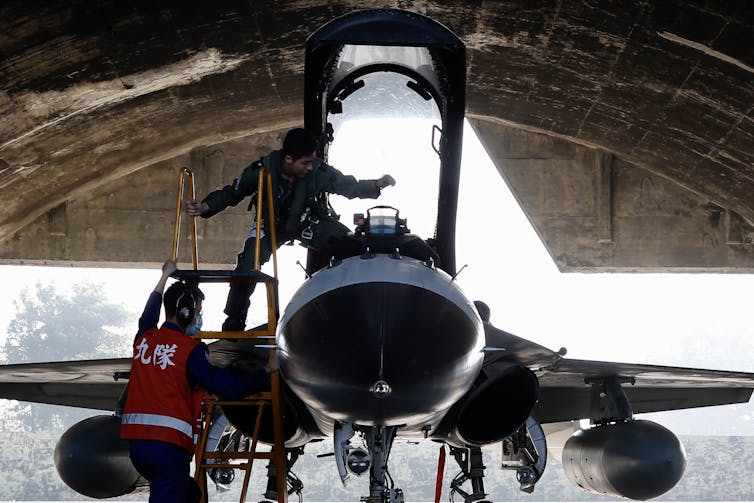Can Taiwan rely on Australia when it comes to China? New poll shows most Australians don't want to send the ADF
- Written by Melissa Conley Tyler, Research Associate, Asia Institute, The University of Melbourne
I have been in Taiwan since April as a visiting fellow. During this time, there are two questions I’ve been consistently asked. What’s happened to Australia’s relationship with China? And what does it mean for Australian support for Taiwan?
The Australia-China relationship I can explain somewhat. I can chart the causes of the downward spiral of relations. I can say why it’s unlikely to improve anytime soon. The 2021 Lowy Institute poll shows how deep the negative sentiment now runs, with only 16% of surveyed Australians expressing trust in China compared with 52% just three years ago.
But how to answer what level of support there is for Taiwan in Australia?
New poll: what do Australians and Taiwanese think?
The Lowy poll last asked Australians this question in 2019. Given the most compelling scenario — where Chinese invades and the United States decides to intervene — only 43% of respondents supported deploying military forces.
With the deterioration of the Australia-China relationship and the talk of war, would we expect this to go up or down?
Read more: China does not want war, at least not yet. It's playing the long game
To try to answer this, I worked with the Australia Institute to survey both Taiwanese and Australians citizens (asking more than 600 people in each country with a 4% margin of error) about each nation’s security and relationship with China.
A China attack?
The results are surprising on two fronts.
First, the degree of threat felt by Australians surveyed is striking. A similar number of Australians think China will launch an armed attack on Australia (42%) as on Taiwan (49%). I don’t think I could find a military planner in the world that would agree with this.
Despite Australia’s distance from China, Australians and Taiwanese have a similar threat perception. Both see China as being a very aggressive country (62% and 65%). Given the great differences of geography and history, this convergence is noteworthy.
 Australians support Taiwanese independence but not necessarily to the point of sending the Australian military.
Darren England/AAP
Australians support Taiwanese independence but not necessarily to the point of sending the Australian military.
Darren England/AAP
Second, more Australians (13%) than Taiwanese (4%) think a Chinese invasion of Taiwan is likely sometime soon. Perhaps Taiwanese think it more likely that China will continue to use “grey zone” coercive tactics rather than attack. Certainly they are not in imminent fear.
Taiwanese are very clear they want independence, with 73% surveyed preferring independence if peaceful relations with China could be maintained. This is in line with other polls.
About half still want independence, even if this leads China to attack. Only 14% of Taiwan’s citizens think they could defend themselves unaided. And only 26% of Taiwanese think the US would commit its armed forces to fight a war against China in defence of Taiwan. But they still want independence. That’s the depth of feeling.
The importance of support for Taiwan
Taiwan has an overriding fear of abandonment. It doesn’t want its security and independence to be seen as something for China and Taiwan to “solve by themselves”. So it is highly relevant whether other countries would come to Taiwan’s aid.
Clearly, Australians are sympathetic to Taiwanese aspirations for independence. Two thirds of those polled agreed Taiwan should still become a new country, even if China decides to attack after Taiwan declares independence.
But in a crisis, could Taiwan rely on Australia? With these polling numbers, I’d advise Taiwanese to be very cautious.
 Taiwan is on high alert after an increase in Chinese military activity in Taiwan’s air zone.
Ritchie B Togo/EPA/AAP
Taiwan is on high alert after an increase in Chinese military activity in Taiwan’s air zone.
Ritchie B Togo/EPA/AAP
Only 21% of Australians agreed the Australian people are prepared to go to war to help the Taiwanese people gain their independence from China. A further 40% were against and 39% were undecided. When we asked the question as “if China incorporated Taiwan, do you agree Australia should send its defence forces to Taiwan?” 37% agreed, 29% were against and 34% were undecided.
While neither is directly comparable to the Lowy poll result (where 43% supported deploying the military), the response is consistent with a relatively low level of support. By contrast, 80% supported using the military to stop a government from committing genocide and 77% to restore law and order in a Pacific nation in the 2019 Lowy poll.
These results suggest that the number of people who support military involvement in Taiwan may even have decreased in the last two years as there has been more talk of war. In the 2021 Lowy Poll, 57% of Australians said in the event of a military conflict between China and US, Australia should stay neutral.
The trouble for Taiwan
Some of the recent tough talk about China from Canberra (think “drums of war”) might give the Taiwanese the impression they can rely on Australia. But Australia should not give Taiwanese false hope.
Read more: Australia would be wise not to pound 'war drums' over Taiwan with so much at stake
Whether Australia would decide whether to become involved in a crisis in the Taiwan Strait would depend on a host of factors, including political and public opinion. Yet the high number of undecideds in the polling figures suggest it would be unwise to assume it would be an easy or popular decision.
Taiwan would be unwise to count on Australia as things currently stand.
Authors: Melissa Conley Tyler, Research Associate, Asia Institute, The University of Melbourne





